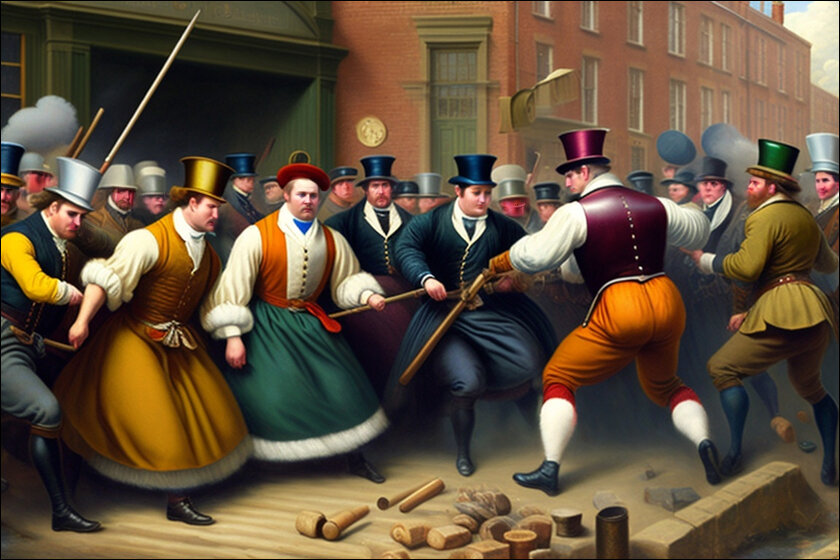The Luddites – a 200-year-old anti-tech cult is raising its head in the AI age but not via loom-breaking workers, but through its very creators itself writes Satyen K. Bordoloi.
If you have looked at your newsfeeds recently, you would have thought the world was close to an end. Every other day there is some technology expert hitting the panic button against Artificial Intelligence. Eliezer Yudkowsky went to the extreme writing in Time Magazine that, “Everyone on Earth will die. Not as in ‘maybe possibly some remote chance,’ but as in ‘that is the obvious thing that would happen.'” For him, it is not a matter of ‘if’ but ‘when’.
This AI fearmongering has gone up exponentially in the past seven months since the sudden eruption into the scene of ChatGPT. There has been an endless barrage of warnings, ostensibly intending to protect humanity.

It has of course led to a lot of confusion e.g. Elon Musk is not only one of the strongest AI doomsayers but also has used AI to make maximum profit in all of his companies. Weeks after signing an open letter urging a moratorium on the development of more powerful AI, he was found shopping for thousands of GPUs allegedly to replicate OpenAI’s ChatGPT.
What is going on, one has naturally to wonder. Help, thankfully arrives, from an ancient anti-tech cult which tells us a lot about the psychology of humanity with regard to tech.

(Image Credit: World History)
The Luddites
We have a tendency of thinking of our times as the most rapidly evolving generation with inventions and discoveries coming out of the woodwork with a single-minded regularity. Though it is true, what we forget are other times equally or more revolutionary. The most scientifically revolutionary time was the beginning of the 19th century. That was the cut-off period when the old world finally began shedding its ancient skin and stepped into the new. The transformation of life – first in Western Europe – thanks to over 100 years of Newtonian Mathematics, 200 years of Galileo and 300 of Copernicus, and the spoils of its empire spread across Asia and Africa, was unbelievable for people still duelling on the streets for honour.
Take just the piston steam engine. Invented 100 years ago in 1712, it led to all manner of inventions, from factories to giant steel boxes that pulled half a dozen wooden boxes filled with people behind them through the countryside as god-smacked men, women and children (remember the most iconic deep focus scene of Apu and his sister watching a train go by a field contrasting their poor life to emerging modernity in Pather Panchali) looked in awe.
This modernity, as expected, led to massive unemployment or reemployment of people from their ancestral trades to utterly new ones. E.g., in the old world, a weaver wove an entire piece of cloth over days from start to finish. By the early 19th century, this was done in minutes in factories where the same skilled weaver was often employed but required less skill and was paid low wages. Naturally, this cloth produced in mill looms was cheap and the condition of workers despicable – conditions whose ruminations would give rise to communism. Add to this the economy of the nation suffering from the Napoleonic war and conflict with the United States causing high unemployment and inflation and you have a powder keg waiting for a spark.

This came on 11 March 1811 in Arnold, Nottingham, England where mill workers rose against their horrible factory conditions. They appropriated the story of someone called Ned Ludd who in 1779 is said to have broken two stocking frames in a fit of rage – to create the archetypal, folkloric character of Captain Ludd, King Ludd or General Ludd – their leader and alleged founder.
The main objection of what came to be known as Luddites – as per Wikipedia, was “to the rising popularity of automated textile equipment, threatening the jobs and livelihoods of skilled workers as this technology allowed them to be replaced by cheaper and less skilled workers.” The movement spread like wildfire across England in the next two years.
The Luddite’s modus operandi was to smash machinery and tools in protest. However, with the upper and middle classes strongly supporting their government, the army was sent to suppress all unrest, particularly the Luddite movement. The result was a complete annihilation of the movement by 1816.
The Luddites have been parodied brilliantly, in the second season of the sci-fi series Future Man where the protagonist lands in a future divided into the most advanced and the most regressive anti-technologist people. Prisoners in the anti-tech colony work all day to smash every piece of technology they can lay their hands on, including innocent toasters.

The Modern ‘AI’ Luddites
The open letter signed in March by 1000 tech leaders like Musk, asked for a six-month moratorium on its development. Can you imagine 6 months without AI? The world would literally come to a standstill. These people demanding the smashing of AI, in a sense, are the modern version of Luddites. There is nothing really to smash in AI as AI runs on the same hardware as modern computing, but this is as close as we can get in our modern society to smashing the machinery.
But that is where the comparisons end. What the Luddites were protesting against was the poor working conditions of their workers. AI entrepreneurs today have no such moral compass. Sure, they are worried about the job losses that would occur from tech like generative AI, but it is not their main botheration. Some of them are earnest reactionaries to the media propaganda against AI and a few like Mr Musk are plain opportunists trying to put their eggs in every AI basket possible – including the anti-AI one.
What these modern ‘Luddites’, ironically, refuse to either acknowledge or merely brush over are the actual dangers of AI, things that are currently going on and not something that will be brought about by ‘superintelligence’, ‘singularity’ or ‘AGI’. Social Media companies in pursuit of profits are employing AI to promote content that engages, but that is often outright false, or at best sow division. Humans are hardwired for fear, the reason why we have survived so long. These social media AI are programmed to promote these fear and outrage-inducing videos because they trigger the most basic response from us all. And that is dangerous.
Musk himself has shoved not yet fully trained AI software as self-driving autopilots down the throats of unsuspecting Tesla buyers. As the Washington Post reported, at least 17 deaths have been caused by crashes involving these autopilot AIs.
Then there is the danger of powerful tools like AI falling into the hands of people with bad intentions. If AI can speed up drug discovery, it can also speed up the creation of chemical and biological weapons that can cause harm to humans. If AI can be used to create quick content, it can also be used to create material whose intention is to spread falsehood and fear. Deepfakes and deep fake porn can cause massive social and personal harm leading to deaths.

The Dangers of Crying Wolf
Anyone who has understood AI well, knows that the danger of the world coming to an end because AI will develop consciousness is next to zero. However, the dangers of unregulated AI in the hands of unscrupulous elements harming the world are 100 per cent real and immediate as it is already happening. Hence, the call to either kill AI or talk about it in an exaggerated, futuristic fashion rather than realistic, immediate ones, only diverts attention from its actual dangers.
When we get accustomed to these people crying wolf, but the purported danger never comes to fruition despite AI’s growth, we will switch off from this fearmongering and not pay heed. Thus, one day when the real dangers of AI get out of hand and are too much to handle and someone rightly raises the alarm, we won’t be paying attention. The danger of crying wolf at the wrong time is that it creates a window of opportunity for the actual wolf to enter and wreak havoc.

The Solution is also The Luddites
The Luddites, sadly, have been villainized in society as anti-technology. What much new historical research about the movement has shown is that they were not anti-tech per se but wanted to highlight the effects of technology on the lives of people. The smashing of looms was merely a visible show of their protest. The visible manifestation of AI in our lives and how it is changing and affecting us is something we need desperately right now. AI is already causing massive unemployment, a problem that will only exacerbate in the future. How we deal with that is an issue more urgent than some gloom and doom futuristic AI singularity.
The need today is for neo-Luddites, AI-Luddites to rise to highlight the real and immediate dangers of the rampant deployment of AI on life and society. Their secondary task could be to expose the hypocrisy, stupidity and evil intentions of the doomsayers of AI, for these people do more harm than any purported good they claim can come from it. They need to tell the world that it is as much in danger from these doomsayers, as any that can be caused by AI, and that looking at any issue as purely white or black, is the greatest whitewash of it all.
In case you missed:
- When Geniuses Mess Up: AI & Mistakes of Newton, Einstein, Wozniak, Hinton
- PSEUDO AI: Hilarious Ways Humans Pretend to be AI to Fool You
- Why is OpenAI Getting into Chip Production? The Inside Scoop
- Anthropomorphisation of AI: Why Can’t We Stop Believing AI Will End the World?
- Unbelievable: How China’s Outsmarting US Chip Ban to Dominate AI
- Nuclear Power: Tech Giants’ Desperate Gamble for AI
- A Teen Suicide Spotlights Dangers of Unregulated AI Companions
- Susan Wojcicki: The Screaming Legacy of The Quiet Architect of the Digital Age
- Rise of the Robolympics: When R2-D2 Meets Rocky Balboa
- Project Stargate: Dubious Origins in the 1970s to AI Goldrush in 2025










1 Comment
AI will destroy jobs and humans will starve to death. My 2040, the population is expected to reach 1900 levels. With now job, no money, the livelihoods of humans will be destroyed, and AI needs to be destroyed before it reaches that level, which will in the 2030s.